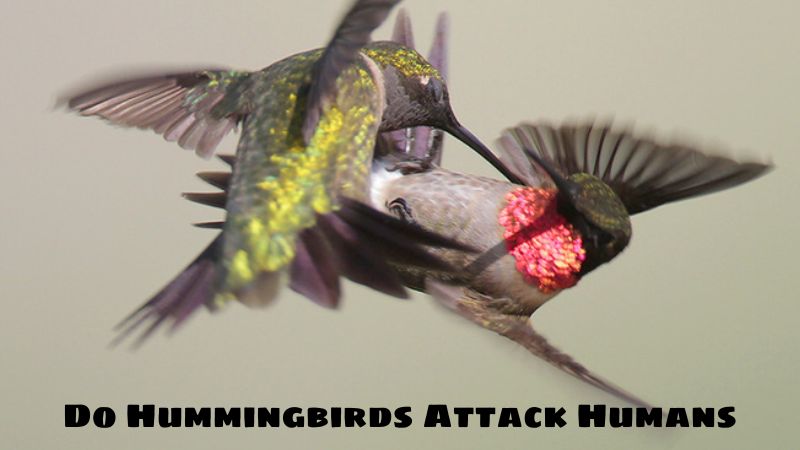Hummingbirds, with their small and almost harmless appearance, are often considered a small nuisance in everyday life. However, the question of whether they can attack humans has always been a controversial topic. It seems that the problem is not as simple as we think.
Are hummingbirds really capable of harming humans or are they merely a source of minor annoyance? These appear to depend on a number of factors, from their habitat to their adaptation to humans. Join Exoticbirdscorner to learn and discover do hummingbirds attack humans?
Do hummingbirds attack humans?
Hummingbirds, with their small size and unique ability to fly, have always been one of the birds that bring excitement to humans. They are widely distributed around the world, especially in tropical and subtropical areas, adorning ecosystems with brilliant colors and mesmerizing movements.
Small but full of vitality, hummingbirds have colorful feathers with many different colors such as red, orange, yellow, green, etc. Their beaks are long and thin, suitable for sucking nectar. Hummingbirds’ wings beat very quickly, creating a characteristic humming sound and allowing them to fly flexibly in many directions, even hovering in mid-air.
The role of hummingbirds in the ecosystem is extremely important. They are effective “pollinators” for flowers, contributing to nature’s biodiversity. Hummingbirds are also a food source for some other animals such as snakes, spiders,…
However, besides their beauty and important roles, hummingbirds also have some mysteries that make people curious, including the question: Do hummingbirds attack humans?
The answer to this question is no. Hummingbirds are gentle and unlikely to harm humans. They only focus on sucking nectar from flowers and pollinating plants. The hummingbird’s small size and long, thin beak do not have enough strength to attack humans.
However, in rare cases, hummingbirds may be attracted to human sweat or perfume, especially sweet scents. At that time, they can fly close and hover around humans, making some people feel worried or uncomfortable. However, this is just the curiosity and feeding behavior of hummingbirds, and they have absolutely no intention of attacking.
In general, hummingbirds are small, beautiful and harmless birds. They bring great value to the ecosystem and contribute to making nature more lively. Instead of worrying about being attacked by hummingbirds, take the time to observe and learn about interesting things surrounding this unique bird.

The reason why many people mistakenly think hummingbirds attack humans
Although hummingbirds are small and harmless birds, some people mistakenly believe that they can attack humans. This comes from a number of factors:
Small size and fast, unexpected movement
Hummingbirds are very small in size, only about 5-10cm, along with the ability to fly quickly and flexibly. When they move near people, especially in areas with lots of flowers, some people may feel worried or frightened by the sudden appearance and rapid movements of these birds.
Loud and shrill song
Some hummingbird species have quite loud and shrill songs, especially during the breeding season. This song can make people feel uncomfortable and hurt their ears, leading to the misunderstanding that the hummingbird is planning to attack.
Hovering near people’s faces
When foraging, hummingbirds can hover near people’s faces to suck nectar from flowers grown in home gardens or in public areas. This can make some people feel threatened or disturbed, leading to the idea that the hummingbird is trying to attack them.
Accidental collisions
In rare cases, hummingbirds may collide with humans by accident, especially when they fly in low light conditions or are attracted to shiny objects such as jewelry. These collisions, although not causing serious injury, can startle and frighten people, leading to the misconception that the hummingbird is attacking.
However, it should be noted that cases of hummingbird attacks on humans are extremely rare and usually only occur when they are injured or feel threatened. Hummingbirds are primarily focused on feeding and pollinating plants, and do not have the ability or intention to attack humans.
A practical explanation of hummingbird behavior
Hummingbirds, with their small size and unique ability to fly, sometimes make many people mistaken about their behavior. However, reality shows that hummingbirds are gentle birds and have absolutely no intention of attacking humans.
Hummingbird food
Hummingbirds mainly eat nectar and small insects, not humans. They use their long and thin beaks to suck nectar from flowers, and also catch insects in the air to supplement protein for their bodies. Therefore, hummingbirds have no reason to attack humans, because humans are not their food source.
Hummingbird instincts
Hummingbirds are not inherently aggressive. They are small in size and often feel scared of larger animals, including humans. When faced with danger, hummingbirds often tend to run away or fly away, rather than attack.
Flying behavior near human faces
Hummingbirds may hover near human faces for a number of reasons, mainly to search for food. For example, if people are growing flowers in their garden, hummingbirds may be attracted to the nectar of these flowers and fly closer to suck the nectar. Or, in some public areas, hummingbirds may search for insects flying around people. However, these behaviors have absolutely nothing to do with attacking, but are simply due to the hummingbird’s foraging instincts.
Collisions with humans
Occasionally, hummingbirds may collide with humans by accident. This often happens when they fly in low light or are attracted to shiny objects like jewelry. These collisions are not intentionally caused by hummingbirds, but are mainly due to accidents or their movement instincts.
Scientific proof of the gentleness of hummingbirds
To further confirm the above information about the gentle nature of hummingbirds, we can refer to the following scientific evidence:
Scientific research
According to in-depth scientific research on hummingbird behavior, there are no recorded cases of attacks on humans. Scientists have tracked and observed hummingbirds in a variety of habitats, from tropical forests to urban areas, and have noted that they show no aggressive behavior or intent to attack. human.
Expert opinion
Ornithologists, who have in-depth knowledge of these birds, also confirm that hummingbirds are not dangerous to humans. They explain that their small size and gentle instincts make hummingbirds unlikely to harm humans. Instead, they spend most of their time foraging and taking care of their children.
Safety when exposed
In fact, many hummingbird lovers regularly observe and photograph them at close range without encountering any danger. This shows that hummingbirds do not consider humans a threat at all and are willing to interact with us peacefully.
Overall, scientific evidence and opinions from experts confirm that hummingbirds are gentle birds and pose no danger to humans. Therefore, when encountering hummingbirds in the wild, take time to observe and appreciate their unique beauty, instead of worrying or being afraid.
Epilogue
Although hummingbirds can be annoying and unsanitary in human habitats, they are not generally considered a major health threat. However, if they are allowed to grow too much, they can be vectors for a number of dangerous infectious diseases.
It is important to maintain a clean environment, limit sources that attract hummingbirds, and control their numbers effectively to protect public health. Understanding and solving this problem plays an important role in maintaining a safe and healthy living environment for humans.





